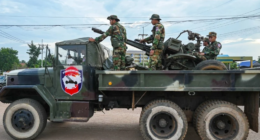This is the third and final part in a three part piece on Taiwan’s 228 Incident and period of White Terror by The Taiwan Times writer Charlene Lin; a collection of thoughts, questions, and observations.
The 228 Incident = The White Terror … or does it?
Most people have difficulty distinguishing the period of White Terror from the 228 Incident.
To correctly do so, it should be known that the 228 Incident was a large scale military massacre that lasted for 3-4 months, starting on February 28th., 1947, whereas the White Terror was a period of secret arrests, interrogations, trials, criminalization and executions in the wake of the 228 massacre that lasted for almost half a century.
Victims of the 228 Incident were shot, tortured and killed in on the streets by soldiers – the first time for Taiwanese people to experience a time of anything close to war.
What happened during the White Terror usually remained unknown, oftentimes for decades.
People just disappeared, and stayed missing until they were sentenced or their body was discovered. The friends and families of these victims remained in the dark for the rest of their lives, not knowing what had happened, and in many cases whether the missing were still alive.
In a brief summary, the people of Taiwan could witness what happened during the 228 Incident, while the White Terror withheld the truth from the masses, and in knock-on effect tortured everyone related to the period, causing panic and grief for lost family and friends.
White Terror – Torture
The hideously cruel methods of torture and made-up crimes at the time are the most prevalent stereotypes of the era that remain in the mindset of people, even today.
However, a greater terror sown across Taiwanese society was person to person disconnect and an overall manipulation of humanity. The government encouraged people to report their family and friends as “communist spies,” and secret agents interrogated people using both torture and also forms of mental manipulation.
Prisoners were persuaded to confess by being told “The others have already confessed and (have been) released” or by targeting their personal weak spots, “Let’s make it simple. I know you have a pregnant wife waiting at home, and you’re the only child of your parents. I was a communist too, but I realized there’s nothing more important than family and staying alive”
To make their victims confess, all forms of extreme and inhumane means, were employed just to “eradicate the red power” in Taiwan.
For Stability – A Necessary Evil
Many justified massacres and criminalization with the statement “to maintain stability, the KMT had no choice.”
While the then Chief Executive of a so-called Taiwan Province, Chen-Yi deceived Taiwanese people following his arrival from China into believing that he would handle the incident properly, and as local Taiwanese started to settle, he secretly deployed soldiers from China with orders to initiate the massacre, claiming that “the penetration of the communist party is too severe. (The) KMT need to take action.”
Massive arrests of suspected communists, eventually including Chen-Yi himself started in the 1950s, at a time Taiwan started to receive military backing from the U.S.; itself embroiled in its own period of anti-communist witch hunts.
In Taiwan at the time, the communist party had barely established itself with very few people having anything to do with the party.
Secret Agents – Brainwashed or Born Evil?
A question that haunts each of us when thinking about these times should be ‘What kind of human-beings could be cruel enough to have committed such atrocities against other humans?’
Did the former Chinese soldiers work in the concentration camps during the Holocaust, and were the secret agents of the White Terror simply born evil, or were they brainwashed into performing such horrendous acts?
Lin Chuan-Kai, who has interviewed many former secret agents, concluded that these people are actually very clever, and possessed their own beliefs to justify what they were doing. According to Lin, none of them have shown any regret regarding their actions at the time.
Those Who Turned to Communism – Deserved It
One of the main obstacles that the Transitional Justice Commission has faced in its quest is the generally negative impression of communism among Taiwanese people.
Those who were proven to believe in, or even those who studied communism have not been decriminalized even today.
Some people in the 1950s, did turn to communism learning about Chairman Mao as a result of their own poverty resulting from the domination of an overseeing landlord class, or their will to overthrow KMT after the 228 Massacre.
In one victim’s memoir, is written, “I heard there’s a party in China, they traveled 25,000 miles and were supported by peasants just to fight against (the) KMT… it must be a very good party.”
Some of these people turned to an ideology opposing capitalism because of their personal resentment of the ruling party. What they saw in their ideals of communism was a fairness across society, and the subsistence and support of the underprivileged regardless of background.
They could never know that 70 years later, in the modern era, the Communist Party would become notorious in international society. Today, many Taiwanese remain trapped in the stereotypical belief that “anyone related to communist party deserves to be institutionalized since it’s evil and it’s the one that violates human rights the most.” But what needs to be identified is that the communism from 70 years ago that they link this belief to, is far far different to the communism seen in today’s China.
Don’t Mention it – You Continue To Hurt the Victims
As a result, some today are of the opinion that mentioning the incidents / victims again and again is hurtful to their relatives or the victims themselves, and it does not help rectify anything because what happened cannot be reversed.
Are the victims and their relatives really that fragile?
In fact, many are very positive when it comes to talking about this period in Taiwanese history, and are engaged in promotional works centering on the era.
Chang Tse-Chou, a professor of Agricultural Chemistry at National Taiwan University, has voluntarily taught the course “Life and Human(ity)” at NTU for 20 years. Despite his own 11-years spent in jail, his presence is as bright as the sun, and he continues to encourage people to ponder the meaning of life through mass education.
Another question to ask on continuing to talk about this part of our history is “What exactly haunts these victims the most?” Of course time in prison and the loss of loved ones was and is very painful, but more and more cases indicate that it was the decades of stigmatization, suppression and bullying from society that has traumatized them.
They need their stories to be known, they need society to understand their life experiences, and to arrive at the conclusion that they did not deserve to be treated like as they were.
We still have a long way to go on our path to transitional justice. The process is not about promoting hatred, pain, and or differences between ethnicities or those holding opposing political stances – it has been about encouraging people to understand a shared history by reading about the lives that were taken or affected by injustice.
It is hoped people will let the truth and their consciousness speak on behalf of justice.
Admittedly, it’s complicated, painful and seemingly endless sometimes.
While we believe that to forgive is to remember, to justify is to understand, to care is to learn, to think and to discuss — someday, peace and love will come to our rescue.










Comments are closed.